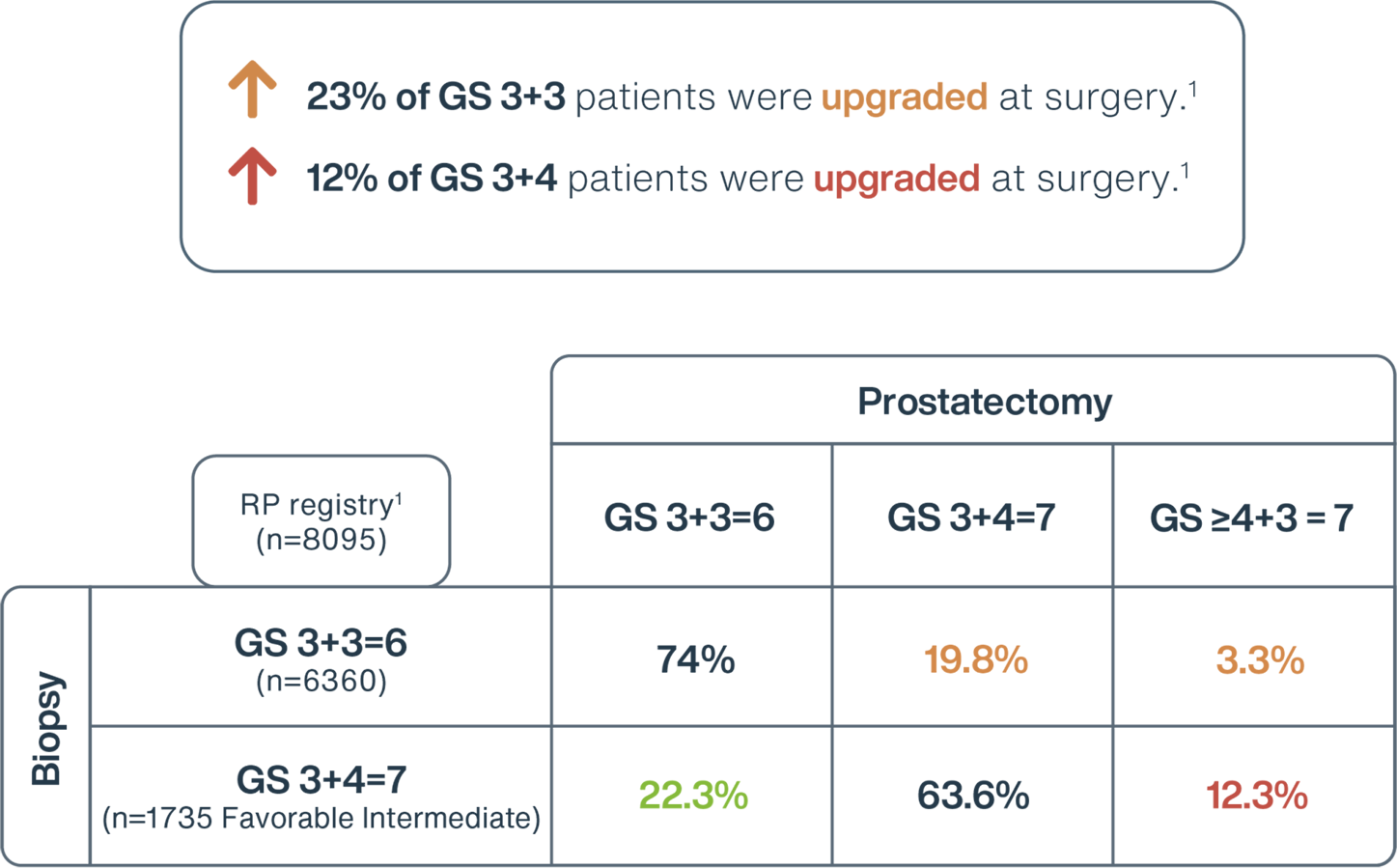| · Albala D, Kemeter MJ, Febbo PG, Lu R, John V, Stoy D et al. Health economic impact and prospective clinical utility of Oncotype DX Genomic Prostate Score. Rev Urol. 2016; 18(3):123-132.
· Dall’Era MA, Maddala T, Polychronopoulos L, Gallagher JR, Febbo PG, and Denes BS. Utility of the Oncotype DX® Prostate Cancer Assay in Clinical Practice for Treatment Selection in Men Newly Diagnosed with Prostate Cancer: A Retrospective Chart Review Analysis. Urology Practice. 2015;2(6):343-348.
· Eure G, Germany R, Given R, Lu R, Shnidel AW, Rothney M, et al. Use of a 17-Gene Prognostic Assay in Contemporary Urologic Practice: Results of an Interim Analysis in an Observational Cohort. Urology. 2017;107:67-75.
· Lynch JA, Rothney MP, Salup RR, Ercole CE, Mathur SC, Duchene DA, et al. Improving Risk Stratification Among Veterans Diagnosed With Prostate Cancer: Impact of the 17-Gene Genomic Prostate Score Assay. Am J Manag Care. 2017;24(1 Suppl):S4-S10.
· Murphy AB, Abern MR, Liu L, Wang H, Hollowell CMP, Sharifi R, Vidal P, et al. Impact of a Genomic Test on Treatment Decision in a Predominantly African American Population With Favorable-Risk Prostate Cancer: A Randomized Trial. J Clin Oncol. 2021;39(15):1660-1670. |
| · Brooks MA, Thomas L, Magi-Galluzzi C, Li J, Crager MR, Lu R et al. GPS assay association with long-term cancer outcomes: twenty-year risk of distant metastasis and prostate cancer-specific mortality. JCO Precis Oncol. 2021;5:PO.20.00325.
· Brooks MA, Thomas L, Magi-Galluzzi C, Li J, Crager MR, Lu R et al. Validating the association of adverse pathology with distant metastasis and prostate cancer mortality 20-years after radical prostatectomy. Urol Oncol. 2022;40(3):104.e1-104.e7.
· Covas Moschovas M, Chew C, Bhat S, Sandri M, Rogers T, Dell’Oglio P, et al. Association Between Oncotype DX Genomic Prostate Score and Adverse Tumor Pathology After Radical Prostatectomy. Eur Urol Focus. 2022;8(2):418-424.
· Cullen J, Rosner IL, Brand TC, Zhang N, Tsiatis AC, Moncur J, et al. A biopsy-based 17-gene genomic prostate score predicts recurrence after radical prostatectomy and adverse surgical pathology in a racially diverse population of men with clinically low- and intermediate-risk prostate cancer. Eur Urol. 2015;69(1):123-131.
· Cullen J, Kuo HC, Shan J, Aboushwareb T, and Van Den Eeden SK. The 17-gene genomic prostate score test as a predictor of outcomes in men with unfavorable intermediate-risk prostate cancer. Urology. 2020;143:103-111.
· Cullen J, Lynch JA, Klein EA, Van Den Eeden SK, Carroll PR, Mohler JL, et al. Multicenter Comparison of 17-Gene Genomic Prostate Score as a Predictor of Outcomes in African American and Caucasian American Men with Clinically Localized Prostate Cancer. J Urol. 2021;205(4):1047-1054.
· Eggener S, Karsh LI, Richardson T, Shindel AW, Lu R, Rosenberg A et al. A 17-gene panel for prediction of adverse prostate cancer pathologic features: prospective clinical validation and utility. Urology. 2019;126:76-82.
· Helfand BT, Paterakos M, Wang CH, Talaty P, Abran J, Bennett J et al. The 17-gene Genomic Prostate Score assay as a predictor of biochemical recurrence in men with intermediate and high-risk prostate cancer. PLoS One. 2022;17(9):e0273782.
· Helfand BT, Paterakos M, Wang CH, Talaty P, Abran J, Bennett J et al. The 17-gene Genomic Prostate Score assay as a predictor of biochemical recurrence in men with intermediate and high-risk prostate cancer. PLoS One. 2022;17(9):e0273782.
· Janes JL, Boyer MJ, Bennett JP, Thomas VM, De Hoedt AM, Edwards DK, et al. Prognostic for outcomes after primary external beam radiation therapy in men with clinically localized prostate cancer. Int J Radiat Oncol Biol Phys. 2023;115(1):120-131.
· Klein EA, Cooperberg MR, Magi-Galluzzi C, Simko JP, Falzarano SM, Maddala T et al. A 17-gene assay to predict prostate cancer aggressiveness in the context of Gleason grade heterogeneity, tumor multifocality, and biopsy undersampling. Eur Urol. 2014;66(3):550–560.
· Kornberg Z, Cowan JE, Westphalen AC, Cooperberg MR, Chan JM, Zhao S, et al. Genomic prostate score, PI-RADS version 2 and progression in men with prostate cancer on active surveillance. J Urol. 2019;201:300-307.
· Leapman MS, Westphalen AC, Ameli N, Lawrence HJ, Febbo PG, Cooperberg M, et al. Association between a 17-gene genomic prostate score and multi-parametric prostate MRI in men with low and intermediate-risk prostate cancer. PLoS One. 2017;12(10):e0185535.
· Lin D, Zheng Y, McKenney JK, Brown MD, Lu R, Crager M, et al. 17-gene genomic prostate score test results in the Canary Prostate Active Surveillance Study (PASS) cohort. J Clin Oncol. 2020;38(14):1549-1557.
· Magi-Galluzzi C, Isharwal S, Falzarano SM, Tsiatis A, Dee A, Maddala T et al. The 17-gene genomic prostate score assay predicts outcomes after radical prostatectomy independent of PTEN status. Urology. 2018;121:132-138.
· Murphy AB, Carbunaru S, Nettey OS, Gornbein C, Dixon MA, Macias V, et al. A 17-Gene Panel Genomic Prostate Score Has Similar Predictive Accuracy for Adverse Pathology at Radical Prostatectomy in African American and European American Men. Urology. 2020; 142:166-173.
· Salmasi A, Said J, Shindel AW, Khoshnoodi P, Felker ER, Sisk Jr AE et al. A 17-gene Genomic Prostate Score assay provides independent information on adverse pathology in the setting of combined multiparametric magnetic resonance fusion-targeted and systematic prostate biopsy. J Urol. 2018;200(3):564-572.
· Van Den Eeden SK, Lu R, Zhang N, Queensberry Jr CP, Shan J, Han JS, et al. A biopsy-based 17-gene genomic prostate score as a predictor of metastases and prostate cancer death in surgically treated men with clinically localized disease. Eur Urol. 2017;73(1):129-138.
|



















